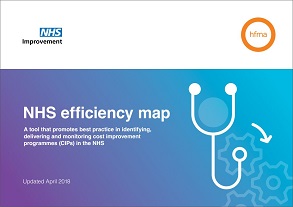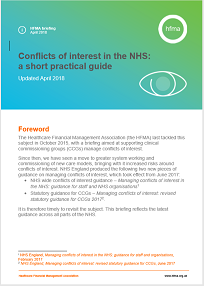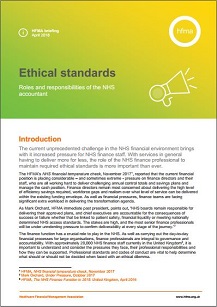Technical review - May 2018
The HFMA has responded to a consultation on amendments to the Charities Statement of Recommended Practice. The changes reflect the latest version of FRS 102. The association largely supported amendments likely to affect NHS charities – the requirement to include comparatives in the accounts for all disclosures; changes on investment properties; and a new requirement to disclose movements in net debt as a note to the cashflow statement. However, it noted that including prior period comparatives for all disclosures can make accounts difficult to read and does not align with the clear and concise disclosure initiatives.
NHS Improvement has updated its guidance on the statutory breakeven duty for NHS trusts. The duty, which does not apply to foundations, was last updated in 2013. The new document replaces that guidance, though NHS Improvement said there are no changes of substance to the operation of the breakeven duty. The changes update terminology and context, it added, including explaining the link between control totals and the breakeven duty. 
The HFMA and NHS Improvement NHS efficiency map has been updated and redesigned. The new-look map includes new links to tools and suggested reading matter and is organised in three sections: enablers for efficiency; provider efficiency; and system efficiency. Some 67 studies, tools and reports have been added, bringing the total to nearly 180. The provider efficiency section also includes a new improvement area giving ideas to improve patient flow.
NHS England and NHS Improvement have published five case studies on the experiences of clinical commissioning groups and trusts that have developed, or are developing, an outcomes-based payment approach for improving access to psychological therapies (IAPT) services. The 2017/19 national tariff included local pricing rule 8, which required commissioners and providers to introduce an outcomes-based approach for IAPT from April 2018. The national bodies said the case studies would provide clarity and further support to the NHS. Some commissioners and providers had concerns that previously developed approaches – or those being developed – would fall foul of rule 8.
A new briefing from the HFMA provides a practical guide to conflicts of interest in the NHS. It is a subject the association has tackled before, most recently in 2015, but the new guide has been updated to recognise the move to greater system working and commissioning of new models of care. A short practical guide to conflicts of interest in the NHS in particular reflects NHS England guidance on managing conflicts of interest – across the NHS and specifically for clinical commissioning groups – published in 2017.
Patient-level costing cost collection file specifications have been issued by NHS Improvement. The templates are aimed at software suppliers and costing practitioners participating in 2017/18 patient-level cost collections. The documents include a data validation tool that assesses the quality of files before submission to NHS Digital – minimising the chance of submission failure and the need to r esubmit. The latest costing newsletter has also been published and includes information on the latest standards, webinars and the costing assurance programme.
esubmit. The latest costing newsletter has also been published and includes information on the latest standards, webinars and the costing assurance programme.
Ethical standards: roles and responsibilities of the NHS accountant is a new briefing from the HFMA that reminds finance staff, governing bodies, clinicians and others of the ethical roles and responsibilities of the NHS accountant. The guide – introduced in a blog by HFMA research manager Lisa Robertson – explores the ethical dilemmas facing NHS finance staff; summarises the ethical requirements; and sets out what NHS finance staff can do to ensure standards are met.
Related content
The Institute’s annual costing conference provides the NHS with the latest developments and guidance in NHS costing.
The value masterclass shares examples of organisations and systems that have pursued a value-driven approach and the results they have achieved.